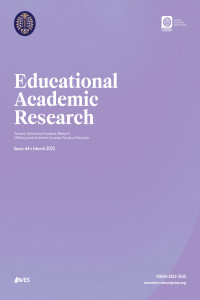EDEBİYAT VE TOPLUMSAL İŞLEVİ
Edebiyat ve toplum ilişkisi, zaman üstü bir değer olarak yerini bugün de korumaktadır. Yazar, okur ve edebiyat evreni, toplumların gelişmişlik ve refah düzeyinin en belirgin göstergeleridir. Barış ortamının, günümüz evreninden bakıldığında tesis edilmesi büyük ölçüde edebiyatın zaman üstü gücüne kavuşmakla sağlanabileceği anlaşılmaktadır. Bu çalışma, edebiyatın toplumsal işlevinin, onun kurmaca dünyasının okurun düş dünyasını besleyerek, yeni üretimler yaratmasına bağlı olduğunu irdelemektedir. Kullanılan yöntem, dokümantasyon analizi ve okur odaklı alımlama süreçlerinden oluşmaktadır.Anahtar Kelimeler: Yazın, Toplum, Okur, Kurgu, Düş Dünyası Literature and Its Social FunctionLiterature and society relationship still has its own place as a value going beyond time. The context of author reader and literature is the most prominent indicator of the prosperity of the societies. Given the modern life perspectives, it is understood that peace can be established by means of reaching literature’s timeless power. This study states that the social function of the literature depends on feeding reader’s fantasy and creating novel products. The method is content analysis and reader focused reception processes.Keywords: Literature, Society, Reader, Fiction, Fantasy
Anahtar Kelimeler:
Yazın, Toplum, Okur, Kurgu, Düş Dünyası
-
Literature and society relationship still has its own place as a value going beyond time. The context of author reader and literature is the most prominent indicator of the prosperity of the societies. Given the modern life perspectives, it is understood that peace can be established by means of reaching literature’s timeless power. This study states that the social function of the literature depends on feeding reader’s fantasy and creating novel products. The method is content analysis and reader focused reception processes
Keywords:
Literature, Society, Reader, Fiction, Fantasy,
___
- Enzensberger, Hans M. (1962); (Çev. Ersel Kayaoğlu), Bir Şiir Nasıl Oluşuyor, Yay. Hazırlayan: Hüseyin Salihoğlu; 1995: 20. yüzyıl Edebiyat Sanatı. İmge Kitabevi s. 18, Ankara. 11
- Escarpit, Robet, (1992). (Çev. Hüseyin Portakal), Edebiyat Sosyolojisi, İletişim Yayınları, İstanbul.
- Geçtan, Engin, (1993). Varoluş ve Psikiyatri, Remzi Kitabevi, İstanbul.
- Moran, Berna, (1998). Türk Romanlarına Eleştirel Bir Bakış, 3, İletişim Yayınları, İstanbul.
- Özbek, Yılmaz, (1996); Okumak, Anlamak, Yorumlamak, Gündoğan Yayınları. Ankara,
- Özbek, (1999); Toplumsal Uzlaşmada Sanatın İşlevi, Atatürk Üniversitesi Güzel Sanatlar Fakültesi Dergisi, Sayı 96.
- Paz, Octavia, (1993). (Çev. Turhan Ilgaz), Modern İnsan ve Edebiyat, Remzi Kitabevi, İstanbul.
- Sartre, J. P: (1982). (Çev. Bertan Onaran), Edebiyat Nedir?, Payel Yayınevi, İstanbul,
- Uygur, Nermi, (1985). İnsan Açısından Edebiyat, Remzi Kitabevi, İstanbul.
- Warning, Rainer, (Hrsg). (1988), Rezeptionsasthetik, Uni Taschenbücher, Wilhelm Fink Verlap München.
- Zıllıoğlu, Merih, (1993). İletişim Nedir? Cem Yayınevi, İstanbul.
- Başlangıç: 2003
- Yayıncı: Atatürk Üniversitesi
Sayıdaki Diğer Makaleler
KAMELYALI KADIN YA DA YOSMAYA HOŞGÖRÜ
Gülden BALAT, Türker SEZER, Hilal TUNÇELİ
Yabancı Dil Öğretimi açısından Etkili Metin olarak Montherlant’ın Ölü Kraliçe’si
Deniz KÜZECİ, Sadık TÜRKOĞLU, Melik BÜLBÜL
ÇEMBERDE AÇILAR KONUSUNUN ÖĞRETİMİNDE CABRİ YAZILIMININ AKADEMİK BAŞARIYA ETKİSİ
SANAT EĞİTİMİ ALAN VE ALMAYAN ÜNİVERSİTE ÖĞRENCİLERİNİN YAŞAM DOYUM DÜZEYLERİNİN KARŞILAŞTIRILMASI
Esra AKDOĞAN, Meryem BOZTAŞ, Yasemin KOÇ
TEKNOLOJİ BİLİMİN UYGULAMASI MIDIR? FEN VE TEKNOLOJİ ÖĞRETMEN ADAYLARININ GÖRÜŞLERİ
Melik BÜLBÜL, Sadık TÜRKOĞLU, Deniz KÜZECİ
ORHAN PAMUK’UN “BENİM ADIM KIRMIZI” ADLI ROMANINDA KIRMIZI
